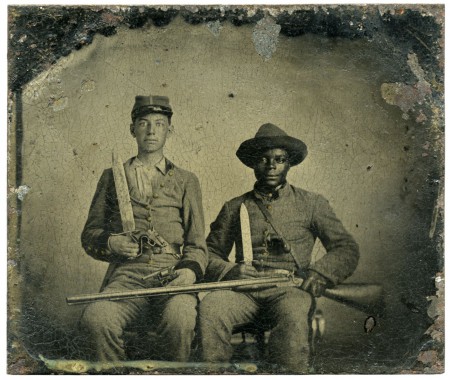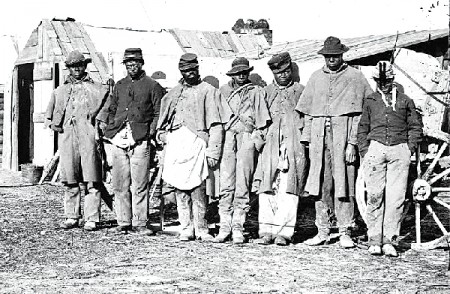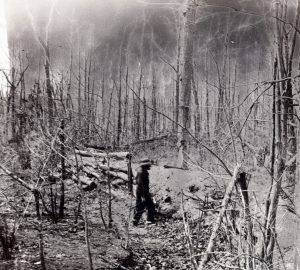
One of the most contentious issues today about the Civil War is that of “Black Confederates.” Proponents of Confederate heritage have argued that thousands of slaves fought willingly in the rank of the Confederate armies. Some historians have argued, quite convincingly, that there is simply no evidence that large numbers of African Americans fought for the south. Most of the black Confederates that are pointed to were actually servants or laborers who were with the army, rather than soldiers who actually bore arms, and the first hand accounts of large numbers of blacks fighting are quite dubious.1
There were, however, real black Confederates! 150 years ago, on March 13, 1865, Jefferson Davis signed a bill to allow the slaves to be enrolled in the Confederate army. Examining this law, and the background of why it was passed, can tell us much about slavery and the causes of the war. When the first states seceded, they did it primarily to protect slavery and its expansion into the western territories. However, the causes of the war are not quite that simple. It was not until Abraham Lincoln called upon the states to put down the rebellion did the rest of the southern states leave the union. The war was really begun over whether the southern states could establish their own Confederacy, though the main motive for wanting that independence was to preserve slavery. This changed in 1863 with the Emancipation Proclamation, which in many ways turned the North’s war to preserve the Union into a crusade to end slavery.

Slavery was one of the foundations of southern society, and even the majority of white southerners who did not own slaves, saw it that way. Allowing the slaves to fight was not even a major consideration at the beginning of the war. One of the south’s greatest fears was that the slaves would rise and massacre all the whites, so putting weapons in their hands was the last thing in some people’s minds.2 However, as the war dragged on, and able bodied fighting men became scarcer and scarcer in the south, some began to reconsider allowing slaves to fight. In January, 1864, Major General Patrick Cleburne,. and several other officers, wrote to Joseph E. Johnston suggesting that the Confederacy emancipate their slaves and add them as soldiers:
Satisfy the negro that if he faithfully adheres to our standard during the war he shall receive his freedom and that of his race. … If, contrary to the training of a lifetime, they can be made [by the Yankees] to face and fight bravely against their former masters, how much more probable is it that with the allurement of a higher reward, and led by those masters, they would submit to discipline and face dangers.3
This was a very weighty suggestion, striking as it did at the master slave relationship, which was woven into the very heart of southern society. The Confederate government, which was made up of many planters who had most of their wealth tied up in their slave property, was not ready to hear this, and Cleburne’s proposal was suppressed. But just a few months later, similar proposals were gaining traction. In October, 1864, the governors of Georgia, Mississippi and North and South Carolina proposed something similar.4 Jefferson Davis himself said on November 7th, “[S]hould the alternative … be presented of subjugation or the employment of the slaves as soldiers, there seems no reason to doubt … our decision.”5 Robert E. Lee wrote in January, 1865:
I think … we must decide whether slavery shall be extinguished by our enemies and the slaves be used against us, or use them ourselves at the risk of the effects which may be produced upon our social institutions. My own opinion is that we should employ them without delay. I believe that with proper regulations they can be made efficient soldiers.6
Congress finally passed a law in March that allowed slaves to be brought into the Confederate military with their owner’s permission, provided that not more than a quarter of male slaves of military age ever be in the army. The law was clear that this would not automatically give the slaves their freedom – “nothing in this act shall be construed to authorize a change in the relation which the said slaves shall bear toward their owners, except by consent of the owners and of the States in which they may reside.”7

Realizing that their choice was between fighting for independence with black soldiers and conquest without them, the Confederates chose the former. This was, however, too little, too late. Just a few weeks later Richmond fell to Ulysses S. Grant, and the rest of the Confederacy quickly crumbled. There had not been time for any black troops to fight in the Confederate army, though if the war had continued a few months, some would have almost certainly done so.
So what does this reveal about the Confederacy’s relationship with slavery? First, slavery was deeply ingrained in southern society. It was not until they were staring conquest in the face that they finally made the decision to allow black troops. Second, it shows how far the southerners were willing to go in dismantling slavery. While they would put weapons into their slaves’ hands, they would not offer emancipation as an incentive to fight. Though if the war had been prolonged for a few more years and they saw that the slaves made good soldiers, we do not know how their position may have changed.
Lastly, it displays the tension between the competing causes of the war. The southerners were fighting for their independence, but they had sought that independence to preserve slavery. As the war wound down they had to decide whether they would sacrifice slavery to win their independence. Different men came to different conclusions on this issue. “The day you make soldiers of [Negroes,]” wrote General Howard Cobb, “is the beginning of the end of the revolution. If slaves make good soldiers, our whole theory of slavery is wrong.8 Samuel Clayton of Georgia said:
We should … promptly take hold of all the means God has placed within our reach to help us through this struggle-a war for the right of self-government. … He who values his property higher than his life and independence is a poor, sordid wretch; a gold worshiper; a slave in spirit.9
The final decision of the Confederate government was to take hold on that means of victory, and sacrifice a small part of their system of slavery in their struggle for independence.

1. Confederate Like Me by Kevin Levin. The Civil War Monitor (Spring 2013) p. 62-79.
2. The Employment of Negroes as Soldiers in the Confederate Army, by Charles H. Wesley. The Journal of Negro History, vol. 4, no. 3 (June 1919) p. 239-253.
3. The War of the Rebellion: A Compiliation of the Official Records of the Union and Confederate Armies (Washington: Government Printing Office, 1898) series I, vol. LII, part II, p. 591.
4. General Cleburne’s Radical Plan. New York Times, January 3, 2014.
5. The Employment of Negroes as Soldiers in the Confederate Army, p. 247.
6. The War of the Rebellion, series IV, vol. III, p. 1013.
7. Ibid, p. 1161.
8. Ibid, p. 1009.
9. Ibid, p. 1010 – 1011.





Great article, Joshua!
is a good websie